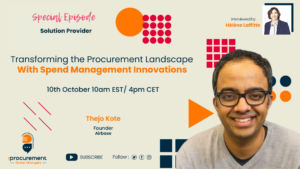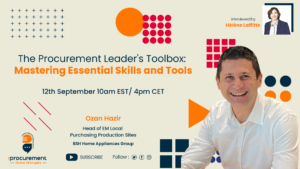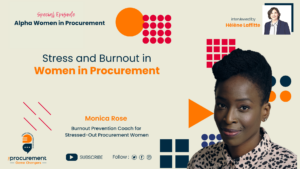Hélène:
Welcome to the procurement game changers, the podcast for leaders that make a difference.
Today, we’ll be talking about the importance of supplier relationship management in procurement. And to discuss this topic, I have the pleasure to receive Kevin Giblin.
Kevin is the head of strategic sourcing at Fitch Group, Inc. Fitch Group is a global leader in financial information services with operations in more than 30 countries. Kevin is a 2017 epic award winner for excellence in procurement.
He has more than 27 years of experience in the procurement industry. Welcome to the show, Kevin.
Kevin:
Thanks, Hélène. Thanks for having me. I look forward to having a chat today.
Hélène:
Wonderful. So, Kevin, could you tell us what led you to procurement?
Kevin:
Yeah, Interesting story. Probably many people have the same type of path to procurement were starting out doing something else.
Let’s remember that the word “sourcing” didn’t even exist in most dictionaries until the 90s and procurement as a function was typically handled by businesspersons themselves kind of doing it along with their daily chores.
So, I remember earlier in my career, I had been in a small company, and I was in the facilities department, also asked to handle, record storage, and then, oh, by the way, that led to, you know, purchase some things too, that the company needs.
There was a company shift, an acquisition. And then I was asked by my new manager who came from GE, he worked on [with] Jack Welsh. So that’s actually a pretty good mentor, for my career. He said: ” you’re doing facilities, records management and purchasing pick one.”
Kevin:
And that was the extent of the conversation. Pick one. And I said, I’ll pick purchasing. And he said, wise choice. And so here I am, I was at a conference, years and years ago, even before that, there was about 300 attendees in that seminar.
And the speaker said, how many of you started your career in procurement? And nobody raised their hand. [He] Said how many people were doing something else well, and then you were asked to take on procurement? And almost everyone raised their hand.
So my story is probably not unique, but there’s how I got my story.
Hélène:
No, absolutely. And I can share that I didn’t start my career in procurement either. So yeah, here you go. So today we’re gonna talk about supplier relationship management.
And so, supplier relationship management is a process to continuously measure and improve the relationship with suppliers starting with their actual performance.
So SRM as we often say, is associated with various SaaS platform, but the approach is much wider and can yield tremendous benefits.
So, why is supplier relationship management so important, in your opinion?
Kevin:
Why is it important? Well, I think, let’s take the question the opposite way. What would happen if you don’t have a supplier relationship? And so I think that’s the better question to ask, but why is it important?
Because I think what’s really important is: this is someone who’s providing a product and, or service [to] your organization. Without them, you have business continuity risk. So, you want to make sure that you build a relationship with them.
So, it’s not just about the contract SLAs [Service-Level Agreement], it’s not just about the quarterly business we use. It’s about what can that supplier also do to help be more innovative and help us be more innovative as a company.
And so it’s building the trust, building that advisory type of a role from your supplier relationships. That’s goes way beyond how did you do against the KPIs?
Hélène:
So SRM is often associated with tools and systems. But it’s a bit like, you know, the CRM in that if you limit your transformation to the tool, then it can very quickly fade and actually doesn’t stick. So is that something that in your experience is true as well with SRM?
Kevin:
Yeah, a hundred percent. I think there’s an old adage that if you have a broken process, the only thing that a tool will do is facilitate visibility to that broken process. So, I think you can have an effective procurement organization without tools.
You can have effective sourcing organization without tools, and you can have effective SRM without the tools. Can they help compliment what you put in place? Yes, but I think if you don’t have the right infrastructure and program in place, the tools will not help.
Hélène:
I have a different version of that adage I have: “if you digitalize a shitty process, you just have a digitalized shitty process.” I can say: “Pardon of my French.” Right. I can say that.
Kevin:
I give you the cleaned-up version, right?
Hélène:
So, why do you think some companies are neglecting their supplier relationships?
Kevin:
I think it’s because they have a misconception about what supplier relationship is. You know, I mentioned earlier a lot of companies have this notion that it’s about making sure that the supplier met their SLAs.
And if they don’t, just yell at them and kick and scream. If that’s the only thing you do with supplier relationships, then you’re missing the point of what it’s all about. Similarly, you know, it’s a subset of the procurement family, right?
So similarly, there’s a big misconception about what strategic sourcing is versus procurement. It’s the same thing, right? No, it’s not. If someone wanted to buy a pen and they went to procurement, procurement would go to the catalog, say: “how many do you need?”, make the transaction and you’ll have your pen shortly.
But if you had the same question to sourcing, [they would] say: “Well, what do you need the pen for? Are there other options for you? Do you want it to be recycled instrument? Do you want it to be from a diversity and inclusion supplier?
And why are you getting a pen in the first place? Can’t you use your computer to write?” So, so we asked all those questions. Same thing with supplier relationship management.
It’s not just about the performance. It’s about how is that supplier’s long term viability. Can they be a partner to us, maybe in other areas that they’re not working with us today on? So it’s a more big-picture, holistic approach.
Hélène:
No, I agree. And I’ve heard in other industries in particular I worked in healthcare as a consultant and they we’re working on co-development with their suppliers. And that goes into what you were saying [it] can go just beyond just a relationship and a performance.
Sometimes the relationship you develop, it’s much more than a client-supplier relationship. So that’s why it’s very important. And, but how do you build and manage those supplier relationships? And can you give us some kind of practical examples of how it could look like?
Kevin:
Yeah, I think you can’t do [this] with every supplier, obviously, because that’s where that segmentation approach comes into play, where you look at your critical strategic suppliers. I’ll give you an example of a supplier that on the surface, you wouldn’t think this would fall into that strategic high important category.
However, it became that way. We looked at our office supplier’s relationship and said: we can do it much more with this.
Now, at the time, we spent quite a bit on office supplies and the markets change. But having this relationship, we ended up doing things with the environmental initiatives [that] were really important.
We reduced the number of the dollars per order, which lowered the number of deliveries, which reduced the carbon footprint.
So there was that benefit, but then there were things beyond that where the supply would come to us and say, Hey, we had a customer in Iowa, for example, that they retrofitted all their warehouse lighting, and they saved millions of dollars.
Now, you would think about that and say, why does that matter for an office supplies company? What’s in it for them? The answer was nothing from a revenue standpoint.
But it builds that trusted relationship that, Hey, we found something out that you might benefit from. So we wanna share that with you.
Hélène:
And so when we started talking about the benefits beyond that,
What would be the benefits from having best in class supplier relationships?
Kevin:
Well, the best in class benefits of having that kind of supplier relationship is you know, things that help your company’s brand.
You know, we partnered with a number of key suppliers. Say, Hey, we want to be in the top 100 green or environmentally from the us companies. And so we put together this road show, brought in some key suppliers and said, we want to be in this together.
And lo and behold, we ended up being from not even on the radar to the top 25 in the span of two years.
Hélène:
Yeah. That’s very good point. So what would be the challenges then?
Kevin:
Challenges is getting buy-in from the business to participate because it’s not a per se savings initiative. It’s not necessarily an efficiency initiative, but it is a brand impact initiative. And whether you’re a public or private company that has a significant impact on your stakeholder viewpoint of the organization.
Hélène:
Is there a risk of having too much intimacy with your suppliers?
Kevin:
Yeah, of course, because you run the risk of having a dependency on them that they become not a single source, but a sole source. And you kind of paint yourself into the corner. You don’t wanna be in that position.
Hélène:
So what do you think about supplier enabled innovation and supplier awards? Is that something that you work with?
Kevin:
Yeah, I do. I like that a lot. I can give you an example. There was a supplier who [had us] visiting their warehouse.
They actually had plaques up on the wall supplier of the year, 2012, 2013, 2015. Now customer visitors say what happened in 2014?
And so that means we did something wrong that year. We want to go back and earn the trust so we can get that award back on a wall. So there’s a motivation factor there.
Hélène:
Yeah. And to a point previously, when you want to do co-development or get some ideas from your suppliers that see all the clients and see in the same industry, sometimes that can give you some ideas on how to improve either your processes or the way you manage your suppliers.
All of this is also part of that. It’s not only project related. It can be also in the process; in the way you engage with the supplier. There’s so much to learn from each other, actually.
Kevin:
Yeah, exactly.
Hélène:
So does SRM apply in your view to all categories? Of course, I’m gonna go back to my own little, you know, chapel, as you say.
Professional services and consulting in particular, it’s a weird category, I would say. But do you think that whatever you said before on supplier relationship management applies to those categories?
Kevin:
I think it can apply to any category, but maybe it’s addressed a little bit differently. You know, obviously if it’s a product supplier, there’s one side of it. If it’s a service supplier, there’s a totally different side. The margin’s a different, there are different lines of business.
They impact the business in a different way, but I think there’s always ways to create this collaborative innovation partnership, no matter.
Hélène:
Yeah. I think that you have a point in saying you address it differently. In my experience, in consulting, in particular, the business lines are much more involved in the process of procurement and therefore they probably also are or should be in the supplier relationship management.
So it has to have some, you know, balance between what the business lines do, what the procurement does and how you make that, you know, make sense.
Kevin:
I agree. The stakeholder involvement for sure. The communication across functions.
Hélène:
Yeah. And you said that before collaboration with the suppliers, but then you have also all the collaboration internally with your stakeholder.
This is a big topic. This is another, this is, that could be another podcast, another topic in itself.
So now it’s the time for the takeaway. So, what is the one thing that you would like our audience to remember from our conversation?
Kevin:
I think you want to think of SRMs by the relationship management, the same way that you would want the business stakeholders of you, procurement. It’s much more than you think on the surface, and you need to invest the time and effort. And if you do, there’s benefits to the program.
Hélène:
Oh, wonderful. Thank you, Kevin. Thank you for your time. I know it’s a topic that’s close to your heart, so I hope that you were able to really say it and describe it as you wanted. I hope that our audience will also be very interested in SRM now and in the future. Thank you.
Kevin:
Thank you. A pleasure. Thanks for having me. Bye now.
Hélène:
So now it’s your turn to tell us about your experience and your challenges with supplier relationship management in the comment section. Don’t forget to subscribe. If you want to be notified when a new episode is out.
Thank you for listening, and I hope you enjoyed this episode. And if that’s the case, don’t forget to give this a thumb up.
So happy sourcing to you all bye. Au Revoir.
PS:- To hear our previous PGC podcast episode, CLICK HERE!







